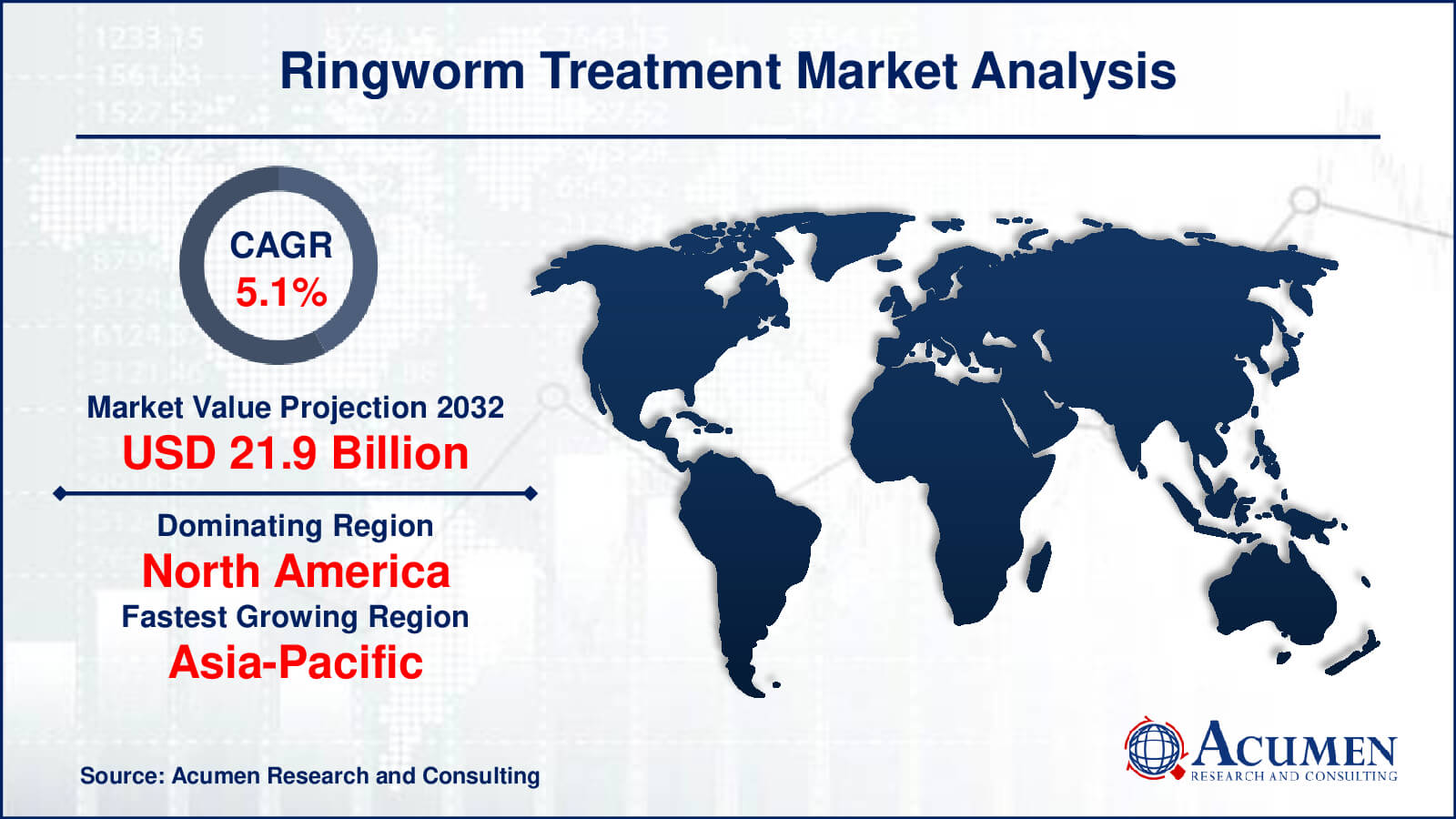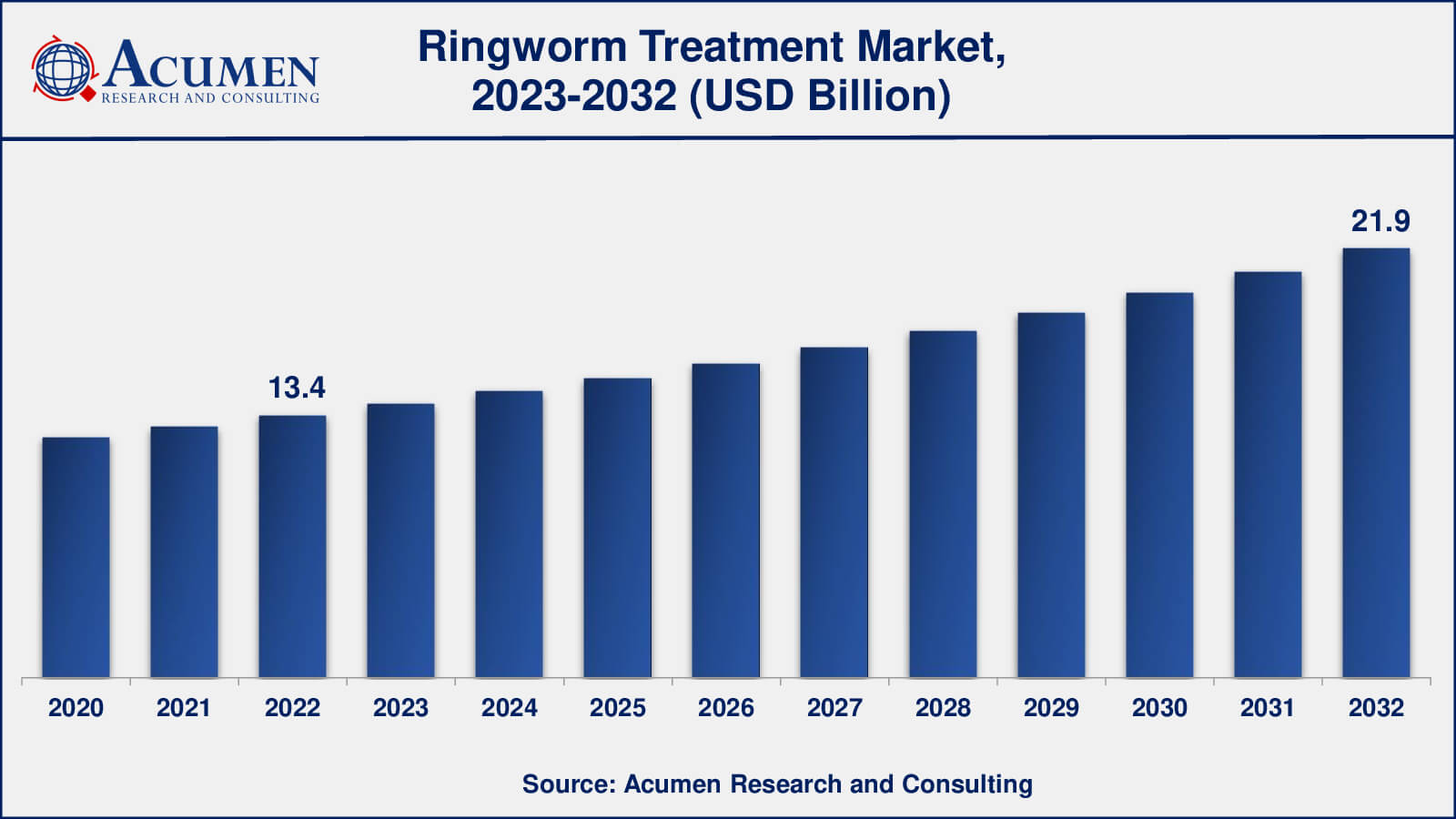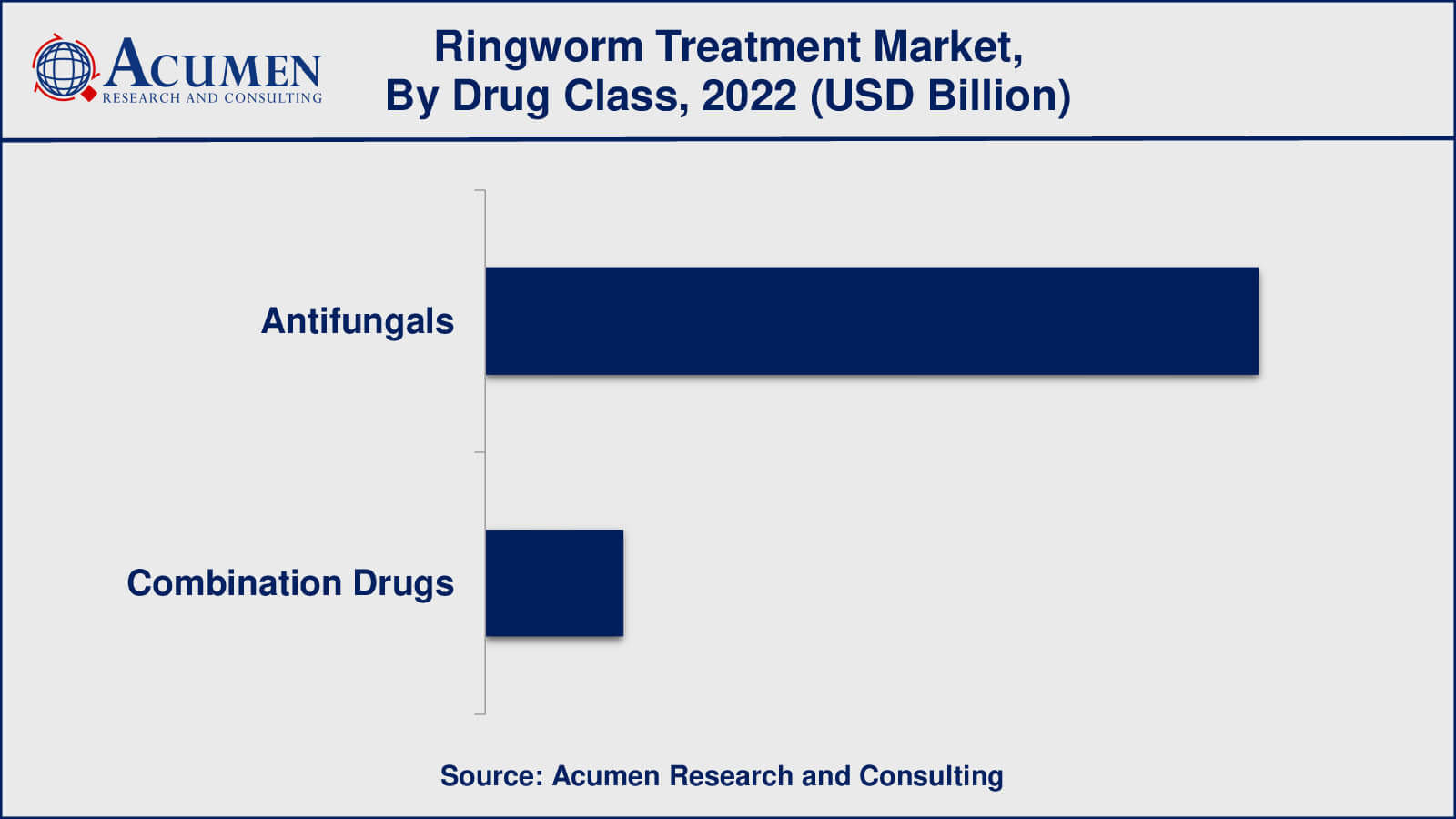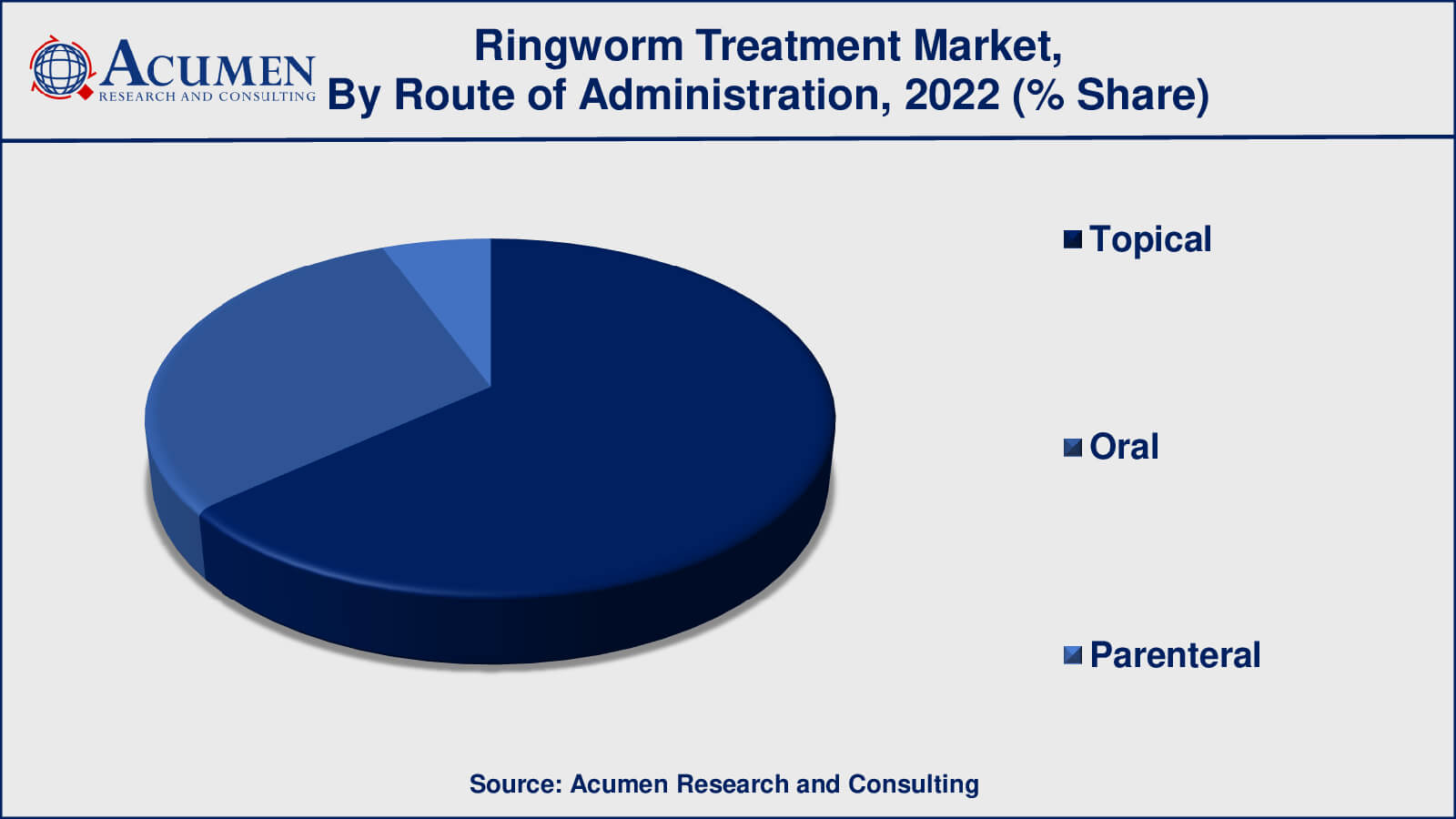Ringworm Treatment Market Size - Global Industry, Share, Analysis, Trends and Forecast 2023 - 2032
Published :
Report ID:
Pages :
Format :
Ringworm Treatment Market Size - Global Industry, Share, Analysis, Trends and Forecast 2023 - 2032
Report Coverage
- Industry Dynamics
- Market Size and Forecast Data
- Segment Analysis
- Competitive Landscape
- Regional Analysis with a Niche Focus on Country-Level Data
- High Level Analysis - Porter's, PESTEL, Value Chain, etc.
- Company Profiles of Key Players
- Option to Customize the Report As Per Your Specific Need
Request Sample Report
The global Ringworm Treatment Market size was valued at USD 13.4 Billion in 2022 and is projected to attain USD 21.9 Billion by 2032 mounting at a CAGR of 5.1% from 2023 to 2032.
Ringworm Treatment Market Highlights
- Global ringworm treatment market revenue is poised to garner USD 21.9 billion by 2032 with a CAGR of 5.1% from 2023 to 2032
- North America ringworm treatment market value occupied around USD 5.7 billion in 2022
- Asia-Pacific ringworm treatment market growth will record a CAGR of more than 6% from 2023 to 2032
- Among drug class, the antifungal sub-segment occupied over US$ 11.2 billion revenue in 2022
- Based on route of administration, the topical sub-segment gathered around 64% share in 2022
- Growing focus on personalized medicine approaches for tailored treatment is a popular ringworm treatment market trend that drives the industry demand

Ringworm therapy often consists of a mix of topical treatments, proper hygiene practices, and, depending on the severity of the illness, oral drugs. To directly target the fungal infection on the skin, topical antifungal lotions or ointments are widely utilized. These drugs often contain active chemicals like clotrimazole, miconazole, terbinafine, or ketoconazole, which operate to kill the fungus that causes ringworm. To guarantee successful therapy, apply the cream or ointment to the afflicted region after thoroughly cleansing and drying it. To avoid a return of the infection, it is critical to continue taking the medicine for the whole term, even if the symptoms appear to have subsided.
Maintaining excellent hygiene practices is critical for ringworm prevention and treatment. Washing the afflicted area with mild soap and water on a regular basis and keeping it dry might help to produce an environment that is less favorable to fungal development. It's also a good idea not to share personal objects like towels, clothes, or hairbrushes, as they might transfer the illness to others or different regions of humans body.
A healthcare provider may administer oral antifungal drugs in more severe situations or when the infection is resistant to topical therapy. These drugs, such as terbinafine or griseofulvin, attack the fungal infection from within the body. They are often taken for a longer period of time and must be closely monitored for any negative effects.

Global Ringworm Treatment Market Dynamics
Market Drivers
- Rising incidence of fungal infections, including ringworm
- Growing consumer preference for over-the-counter antifungal treatments
- Technological advancements in topical antifungal formulations
- Increasing healthcare expenditure supporting treatment demand
Market Restraints
- Emergence of drug-resistant strains impacting treatment efficacy
- Adverse effects associated with systemic oral antifungal medications
- Lack of universal access to quality healthcare hindering treatment adoption
- Limited awareness in remote and underserved regions about ringworm and its treatments
Market Opportunities
- Development of novel, more potent antifungal agents
- Expansion of telemedicine services facilitating remote treatment consultations
- Collaboration between pharmaceutical companies and research institutions for innovative solutions
Ringworm Treatment Market Report Coverage
| Market | Ringworm Treatment Market |
| Ringworm Treatment Market Size 2022 | USD 13.4 Billion |
| Ringworm Treatment Market Forecast 2032 | USD 21.9 Billion |
| Ringworm Treatment Market CAGR During 2023 - 2032 | 5.1% |
| Ringworm Treatment Market Analysis Period | 2020 - 2032 |
| Ringworm Treatment Market Base Year | 2022 |
| Ringworm Treatment Market Forecast Data | 2023 - 2032 |
| Segments Covered | By Drug Class, By Route of Administration, By Type, By Age Group, By Distribution Channel, And By Geography |
| Regional Scope | North America, Europe, Asia Pacific, Latin America, and Middle East & Africa |
| Key Companies Profiled | Actiza Pharmaceutical, Avik Pharma, Chempro Group India, Glenmark Pharmaceuticals Inc., GlaxoSmithKline Plc, Merck & Co., Inc., Novartis AG, Perrigo Company plc, Taro Pharmaceutical Industries Ltd., and Teva Pharmaceuticals, Inc. |
| Report Coverage |
Market Trends, Drivers, Restraints, Competitive Analysis, Player Profiling, Covid-19 Analysis, Regulation Analysis |
Ringworm Treatment Market Insights
A variety of aspects drive the growth and development of the ringworm treatment market. Several factors contribute to the growth of this industry. One important cause is the increasing incidence of fungal illnesses, such as ringworm. As more instances are reported throughout the world, so does the demand for better treatment alternatives. Furthermore, the increased consumer demand for over-the-counter antifungal medications has boosted the industry, as individuals seek simple ways to treat such infections on their own.
Technological developments in topical antifungal formulations are also important drivers of market expansion. These advancements not only improve therapeutic efficacy but also give more easy delivery techniques, drawing more patients to these options. Furthermore, the continual rise in healthcare spending, particularly in emerging nations, creates a favorable climate for the business to thrive. As more people acquire access to healthcare, the need for ringworm treatment grows, adding to the market's growth.
The market, however, is not without its difficulties. The rise of drug-resistant forms of the fungi that cause ringworm is a serious impediment. Because of these resistant strains, standard therapies may become ineffective, necessitating the discovery of new antifungal medicines. Furthermore, the possible side effects of systemic oral antifungal medicines restrict their broad usage. This makes it difficult to strike a compromise between effective therapy and patient safety.
Access to high-quality healthcare is sometimes a constraint, particularly in distant and underdeveloped areas. Inadequate knowledge of ringworm and its therapies might impede prompt diagnosis and treatment beginning. While technological advances in telemedicine services have the potential to narrow this gap, universal access remains an issue. Moreover, despite the industry's potential, there is a dearth of comprehensive awareness campaigns and educational activities concerning fungal diseases and associated treatments, limiting total market growth.
Despite these obstacles, the ringworm treatment business offers several prospects. The discovery of new, more effective antifungal drugs offers great potential. These advances have the potential to change the landscape by tackling medication resistance and improving treatment effectiveness. The rise of telemedicine services also provides an opportunity, particularly in reaching out to distant places where healthcare access is restricted. Collaboration between pharmaceutical corporations and research universities can result in unique solutions that propel the industry forward by providing new treatment alternatives.
Personalized medical techniques provide another option for growth as the sector advances. Individualized therapy based on patient characteristics can improve results and patient satisfaction. Overall, the ringworm treatment market is defined by a complex interplay of drivers, constraints, and opportunities, leading players to constantly adapt and innovate to satisfy the growing demands of patients globally.
Ringworm Treatment Market Segmentation
The worldwide market for ringworm treatment is split based on drug class, route of administration, type, age group, distribution channel, and geography.
Ringworm Treatment Drug Classes
- Antifungals
- Combination Drugs

Antifungals have long dominated the ringworm treatment sector, according to an industry research. Ringworm and other fungal diseases are typically treated with antifungal medicines. They are particularly developed to target and eradicate the fungus that cause these diseases. Depending on the severity and location of the illness, antifungals can be delivered as topical creams, ointments, or oral drugs.
While combination medications may be useful in some circumstances, antifungals remain the cornerstone of ringworm treatment due to their specific activity against fungal diseases. As the name implies, combination medicines entail the use of numerous medications, sometimes from different classes, to treat distinct parts of an illness or infection. Antifungal treatments are often used as monotherapy in the context of ringworm, and the use of combination therapies is less prevalent as compared to other medical illnesses.
Ringworm Treatment Route of Administrations
- Topical
- Oral
- Parenteral

The topical mode of delivery has previously dominated the ringworm treatment market. Topical therapies involve the application of drugs directly to the skin's surface, therefore addressing the illness at its source. To effectively treat ringworm on the skin, topical antifungal creams, ointments, and lotions are routinely utilised.
While oral and parenteral (injectable) therapies are used in some circumstances, topical treatments for ringworm are typically preferable due to their direct application to the afflicted region. Topical antifungals function locally, lowering the likelihood of systemic adverse effects and providing a handy option to treat localised infections.
Oral drugs may be taken if the infection is more severe or resistant to topical therapy. These systemic antifungal medications target the infection from within the body and are normally reserved for instances that do not react well to topical alternatives. Parenteral administration, which involves injections, is less prevalent in ringworm therapy and is usually reserved for severe instances where oral and topical therapies have failed.
Ringworm Treatment Types
- Tinea Corpois
- Tinea Pedis
- Tinea Cruris
- Tinea Capitis
- Tinea Manuum
- Others
According to the ringworm treatment market analysis, tinea corporis (ringworm of the body) and tinea pedis (athlete's foot) tend to dominate the ringworm treatment market. These two forms of fungal infections are prevalent, and they frequently necessitate medical attention owing to their impact on everyday life and propensity for spread.
Tinea Corporis affects the skin on many regions of the body, with the exception of the feet, groyne, and scalp. It usually manifests itself as red, itchy, circular rashes with raised edges and a clearer centre, like a ring. Tinea corporis can be contracted by coming into close touch with an infected person, animal, or contaminated material. Its apparent symptoms and potential for spread encourage people to seek treatment, making it a key commercial focus.
Tinea Pedis, often known as athlete's foot, is a foot condition characterised by itching, burning, peeling, and cracking skin, most commonly between the toes. It is a common ailment, particularly among those who habitually wear closed-toe shoes or participate in activities that cause their feet to sweat. Tinea Pedis therapy has a considerable market share because to its pain and influence on everyday activities.
Ringworm Treatment Age Groups
- Below 18 Years
- 18 - 35 Years
- 35 - 50 Years
- 50 Years and Above
The 18 - 35 years age group tends to dominate the ringworm treatment market. This age group is especially energetic and socially engaged, increasing the probability of exposure to ringworm-causing fungus in a variety of settings. Furthermore, this age group frequently engages in activities that may result in increased sweat or direct skin-to-skin contact, both of which can aid in the development of fungal illnesses such as ringworm.
The ringworm may afflict people of all ages, and its incidence varies based on factors including geographical location, temperature, and lifestyle. While the 18 - 35 years age group may predominate in some locations, other age groups such as below 18 years and 35 - 50 years may have variable degrees of importance in other areas.
Ringworm Treatment Distribution Channels
- Hospital Pharmacies
- Retail Pharmacies
- Online Pharmacies
According to the ringworm treatment market analysis, retail pharmacies tend to dominate the market. Over-the-counter drugs, such as topical antifungal creams and ointments typically used for ringworm therapy, are frequently available at retail pharmacies. These pharmacies are easily situated and generally trusted by customers, making them a popular option for purchasing drugs to treat common skin illnesses such as ringworm.
Hospital pharmacies also play an important role, especially when more serious instances of ringworm or other fungal diseases necessitate prescription-strength drugs. Patients who have been diagnosed and treated at a healthcare facility are served by these pharmacies.
Online pharmacies have grown in popularity in recent years due to the convenience of online buying and the increased availability of pharmaceuticals. However, internet pharmacies' dominance in the ringworm treatment industry might fluctuate depending on factors like as local restrictions, client preferences, and the necessity for rapid treatment.
Ringworm Treatment Market Regional Segmentation
North America
- U.S.
- Canada
Europe
- U.K.
- Germany
- France
- Spain
- Rest of Europe
Asia-Pacific
- India
- Japan
- China
- Australia
- South Korea
- Rest of Asia-Pacific
Latin America
- Brazil
- Mexico
- Rest of Latin America
The Middle East & Africa
- South Africa
- GCC Countries
- Rest of the Middle East & Africa (ME&A)
Ringworm Treatment Market Regional Analysis
In North America, a well-developed healthcare infrastructure and a high degree of understanding about fungal illnesses contribute to a sizable market share. The region's concentration on complex medical therapy drives demand for effective ringworm treatments, both prescription and over-the-counter.
Ringworm incidence varies across Europe due to differences in environment and lifestyle. A considerable market is supported by developed healthcare systems and widespread knowledge, while advancements in antifungal medication research and healthcare access play critical roles.
The Asia-Pacific area is witnessing a variety of developments. Fungal infections are more common in countries with dense populations and tropical climates, fueling demand for therapies. Access to healthcare varies, influencing treatment options. Increasing healthcare investments and public awareness initiatives help to drive market expansion.
Ringworm Treatment Market Players
Some of the top ringworm treatment companies offered in our report includes Actiza Pharmaceutical, Avik Pharma, Chempro Group India, Glenmark Pharmaceuticals Inc., GlaxoSmithKline Plc, Merck & Co., Inc., Novartis AG, Perrigo Company plc, Taro Pharmaceutical Industries Ltd., and Teva Pharmaceuticals, Inc.
Frequently Asked Questions
What was the size of the global ringworm treatment market in 2022?
The size of ringworm treatment market was USD 13.4 billion in 2022.
What is the ringworm treatment market CAGR from 2023 to 2032?
The ringworm treatment market CAGR during the analysis period of 2023 to 2032 is 5.1%.
Which are the key players in the ringworm treatment market?
The key players operating in the global ringworm treatment market are Actiza Pharmaceutical, Avik Pharma, Chempro Group India, Glenmark Pharmaceuticals Inc., GlaxoSmithKline Plc, Merck & Co., Inc., Novartis AG, Perrigo Company plc, Taro Pharmaceutical Industries Ltd., and Teva Pharmaceuticals, Inc.
Which region dominated the global ringworm treatment market share?
North America region held the dominating position in ringworm treatment industry during the analysis period of 2023 to 2032.
Which region registered fastest CAGR from 2023 to 2032?
Asia-Pacific region exhibited fastest growing CAGR for market of ringworm treatment during the analysis period of 2023 to 2032.
What are the current trends in the global ringworm treatment industry?
The current trends and dynamics in the ringworm treatment industry include rising incidence of fungal infections, growing consumer preference for over-the-counter antifungal treatments, and technological advancements in topical antifungal formulations.
Which drug class held the maximum share in 2022?
The antifungal drug class held the maximum share of the ringworm treatment industry.


